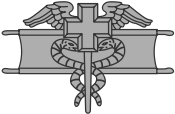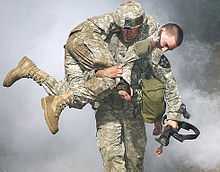Expert Field Medical Badge
| Expert Field Medical Badge | |
|---|---|
 | |
| Awarded by United States Army | |
| Type | Badge |
| Eligibility | US military medical personal. |
| Awarded for | Completion of all Expert Field Medical Badge requirements. |
| Status | Currently awarded |
| Statistics | |
| Established | 1965 |
| Last awarded | Currently awarded |
| Precedence | |
| Next (higher) | Expert Infantryman Badge |
| Next (lower) | Parachutist Badges[1] |
The Expert Field Medical Badge (EFMB) is a United States Army decoration first created on June 18, 1965. This badge is the non-combat equivalent of the Combat Medical Badge (CMB) and is awarded to medical personnel of the US Military who successfully complete a set of qualification tests including both written and performance portions.
Army regulations prohibit the wearing of both decorations simultaneously by personnel awarded the Expert Field Medical Badge and the Combat Medical Badge. In such cases, the Combat Medical Badge has precedence according to Army Regulation 670-1.
The infantry equivalent of the Expert Field Medical Badge is the Expert Infantryman Badge (EIB).
The pass rate for FY 2013 was 19%, making the EFMB one of the most difficult and prestigious Army skill badges to earn.[2]
Current test requirements (as of 2013)
- Comprehensive Written Test
- 60 multiple choice questions; 75% to pass.
- Army Physical Fitness Test
- Pass to standard.
- M16 or M4 Weapons Qualification
- Pass to standard within last 12 months.
- Land Navigation
- Day and night land navigation courses.
- Forced Road March
- 12-mile road march with a standard fighting load to be completed in three hours.
- Current CPR certification
- Tactical Combat Casualty Care Tasks
- Perform a TCCC patient assessment
- Triage casualties
- Control bleeding using a tourniquet, hemostatic device, and dressings
- Initiate a saline lock and IV
- Initiate treatment for hypovolemic shock & prevent hypothermia
- Insert nasopharyngeal airway
- Treat a penetrating chest wound
- Perform needle chest decompression
- Treat an open abdominal wound
- Treat a casualty with an open head injury
- Immobilize a suspected fracture of the arm
- Treat eye lacerations/contusions/extrusions
- Medical and Casualty Evacuation Tasks
- Evacuate a casualty using a SKED litter and litter carries
- Evacuate casualties using one- or two-person carries or drags
- Extricate a casualty from a vehicle
- Establish a helicopter landing point
- Load casualties onto a helicopter, ground evacuation platform, and two nonstandard vehicles
- Warrior Skills Tasks
- Protect self from chem/bio contamination with protective mask
- Decontaminate self with chemical decon kits
- Protect self from CBRN injury or contamination with JSLIST gear
- Store protective mask
- Protect self from bio/chem contamination when removing JSLIST
- Perform self-aid for mild nerve agent poisoning
- Correct malfunction of M16 or M4
- Disassemble, assemble, and perform functions check of an M9 pistol and an M16 (or M4) rifle
- Move under direct fire, react to indirect fire, and react to an UXO or possible IED
- Move over, through, and around obstacles
- Communications Tasks (5 Tasks)
- Assemble and operate SINCGARS or SINCGARS (ASIP) w/o ANCD
- Load FH/COMSEC data and conduct radio check using SINCGARS / SINCGARS (ASIP)
- Prepare and Transmit a MEDEVAC request (All 9 lines) (No longer a Mandatory GO)
- Submit an NBC 1 Report
- Submit an Explosive Hazard Spot Report
Previous test requirements (before 2008)

- Comprehensive Written Test
- 100 multiple choice questions; 75% to pass.
- Army Physical Fitness Test
- Pass to standard.
- M16 Weapons Qualification
- Pass to standard within last 12 months.
- Land Navigation
- Day and night land navigation courses.
- Forced Road March
- 12-mile road march with a standard fighting load to be completed in three hours.
- Litter Obstacle Course
- Done as a 4-man team with candidates graded individually.
- Lane testing
- Tasks graded individually but lanes are pass/fail.
- Communications: Competency with field radios and radio techniques. "Prepare and transmit a MEDEVAC request" must be one of the three of four tasks passed in order to receive an overall "GO" for the lane.
- Survival: Demonstrate knowledge of survival skills in an NBC environment and combat situations including use of the M16 series rifle.
- Emergency Medical Treatment: Demonstrate treatment of various wounds similar to those in a combat situation.
- Evacuation of Sick and Wounded: Demonstrate evacuation techniques utilizing vehicles and manual carries.
- Cardiopulmonary Resuscitation (CPR): Demonstrate proficiency in CPR using the one-person method.
In summary, current requirements differ from previous requirements with the addition of the M9 Pistol for survival tasks, CPR card certification in lieu of demonstrating CPR proficiency, and the reorganization of the lanes into a combat scenario.
References
External links
- Information Paper on EFMB testing changes (May 2005)
- Expert Field Medical Badge Branch Website
- AR 672-10 Expert Field Medical Badge (June 1984)
- EXPERT FIELD MEDICAL BADGE (EFMB) TEST 2 January 2004 Pam 350-10
- What to expect at the EFMB
| ||||||||||||||||||||||||||||||||||